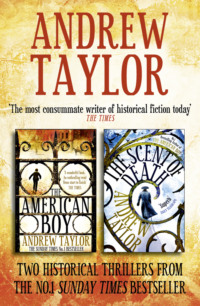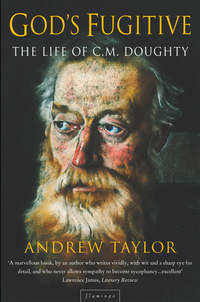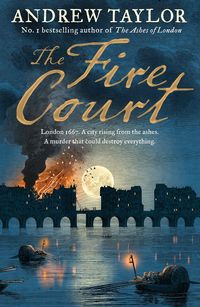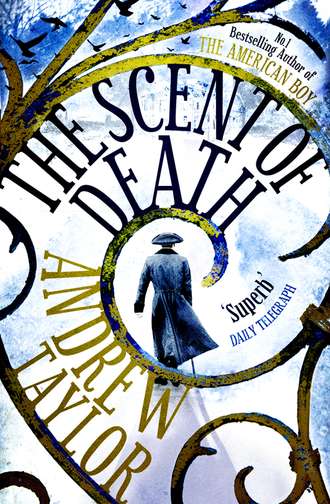
Полная версия
The Scent of Death

Praise for The Scent of Death
‘Andrew Taylor has been quietly producing superb historical fiction since long before Hilary Mantel’s Man Booker wins bestowed literary respectability on the genre … He has the first-rate historian’s ability to channel the spirit of his period and let it speak for itself, combined with a masterly command of plotting and pace. His hair’s-breadth-escape set pieces are superb’
Daily Telegraph
‘Andrew Taylor’s epic historical detective novel is an absorbing and harrowing tale of the last part of America under British rule … The 18th century voice is beautifully achieved: Taylor is as good at this period as C J Sansom is at Tudor England, and like him pulls off novels that work both as literary fiction and detective stories … The mud, blood, corruption and cruelty of early Manhattan ratchet up the suspense’
Independent
‘The narrative unfolds with a leisurely confidence that allows unhurried opportunities for character and motivation to emerge. As the plot satisfyingly thickens to take in profiteering, and love and sex across the racial divide, Taylor once again shows how skilful a historical novelist he is’
Sunday Times
‘Andrew Taylor is an expert in the realm of murder and mystery fiction … The Scent of Death is a triumph of genre plotting: a detective story, and a piece of period writing that excites and surprises in equal measure … Taylor recognizes that successful page-turners come from the author removing himself from view and simply concentrating on telling a story that keeps readers interested to the end. In this respect, The Scent of Death undoubtedly and thrillingly succeeds’
Spectator
‘Andrew Taylor’s historical crime fiction is always an event. Ten years ago The American Boy, a gothic tale of the young Edgar Allan Poe in Regency England, deservedly won him a second CWA Historical Dagger. The Anatomy of Ghosts, from 2010, was both rambunctious and chilling, stripping away the demure veneer of Cambridge to reveal a wilder, and weirder, underside. Now he turns to Manhattan, although not as we know it’
Guardian
‘Taylor has emerged as an historical novelist with a rare gift for mood and atmosphere – especially the 18th century’
i
‘Andrew Taylor is one of the most imaginative historical mystery novelists writing today. Expect this to appear on a lot of “Best Of 2013” lists’
Globe and Mail
ANDREW TAYLOR
The Scent of Death

Copyright
This novel is entirely a work of fiction. The names, characters and incidents portrayed in it are the work of the author’s imagination. Any resemblance to actual persons, living or dead, events or localities is entirely coincidental.
Harper
An imprint of HarperCollinsPublishers
77–85 Fulham Palace Road,
Hammersmith, London W6 8JB
www.harpercollins.co.uk
First published in Great Britain by HarperCollinsPublishers 2013
Copyright © Andrew Taylor 2013
Prelims map credit © Nicolette Caven 2013
Cover layout © HarperCollinsPublishers 2013
Cover photographs © Roy Bishop / Arcangel Images (iron gate); Jill Battaglia / Arcangel Images (figure); Shutterstock (house)
Designed by www.emma-rogers.com
Andrew Taylor asserts the moral right to be identified as the author of this work
A catalogue record for this book is available from the British Library
All rights reserved under International and Pan-American Copyright Conventions. By payment of the required fees, you have been granted the non-exclusive, non-transferable right to access and read the text of this e-book on screen. No part of this text may be reproduced, transmitted, down-loaded, decompiled, reverse engineered, or stored in or introduced into any information storage and retrieval system, in any form or by any means, whether electronic or mechanical, now known or hereinafter invented, without the express written permission of HarperCollins.
Source ISBN: 9780007213535
Ebook Edition © 18 July 2013 ISBN: 9780007493074
Version: 2014-07-17
To Will with love
Table of Contents
Praise for The Scent of Death
Title Page
Copyright
Dedication
Map
Chapter One
Chapter Two
Chapter Three
Chapter Four
Chapter Five
Chapter Six
Chapter Seven
Chapter Eight
Chapter Nine
Chapter Ten
Chapter Eleven
Chapter Twelve
Chapter Thirteen
Chapter Fourteen
Chapter Fifteen
Chapter Sixteen
Chapter Seventeen
Chapter Eighteen
Chapter Nineteen
Chapter Twenty
Chapter Twenty-One
Chapter Twenty-Two
Chapter Twenty-Three
Chapter Twenty-Four
Chapter Twenty-Five
Chapter Twenty-Six
Chapter Twenty-Seven
Chapter Twenty-Eight
Chapter Twenty-Nine
Chapter Thirty
Chapter Thirty-One
Chapter Thirty-Two
Chapter Thirty-Three
Chapter Thirty-Four
Chapter Thirty-Five
Chapter Thirty-Six
Chapter Thirty-Seven
Chapter Thirty-Eight
Chapter Thirty-Nine
Chapter Forty
Chapter Forty-One
Chapter Forty-Two
Chapter Forty-Three
Chapter Forty-Four
Chapter Forty-Five
Chapter Forty-Six
Chapter Forty-Seven
Chapter Forty-Eight
Chapter Forty-Nine
Chapter Fifty
Chapter Fifty-One
Chapter Fifty-Two
Chapter Fifty-Three
Chapter Fifty-Four
Chapter Fifty-Five
Chapter Fifty-Six
Chapter Fifty-Seven
Chapter Fifty-Eight
Chapter Fifty-Nine
Chapter Sixty
Chapter Sixty-One
Chapter Sixty-Two
Chapter Sixty-Three
Chapter Sixty-Four
Chapter Sixty-Five
Chapter Sixty-Six
Chapter Sixty-Seven
Chapter Sixty-Eight
Chapter Sixty-Nine
Chapter Seventy
Chapter Seventy-One
Chapter Seventy-Two
Chapter Seventy-Three
Chapter Seventy-Four
Chapter Seventy-Five
Chapter Seventy-Six
Chapter Seventy-Seven
Chapter Seventy-Eight
Chapter Seventy-Nine
Chapter Eighty
Chapter Eighty-One
Chapter Eighty-Two
Chapter Eighty-Three
Chapter Eighty-Four
Chapter Eighty-Five
Afterword
Acknowledgements
About the Author
By the same author
About the Publisher
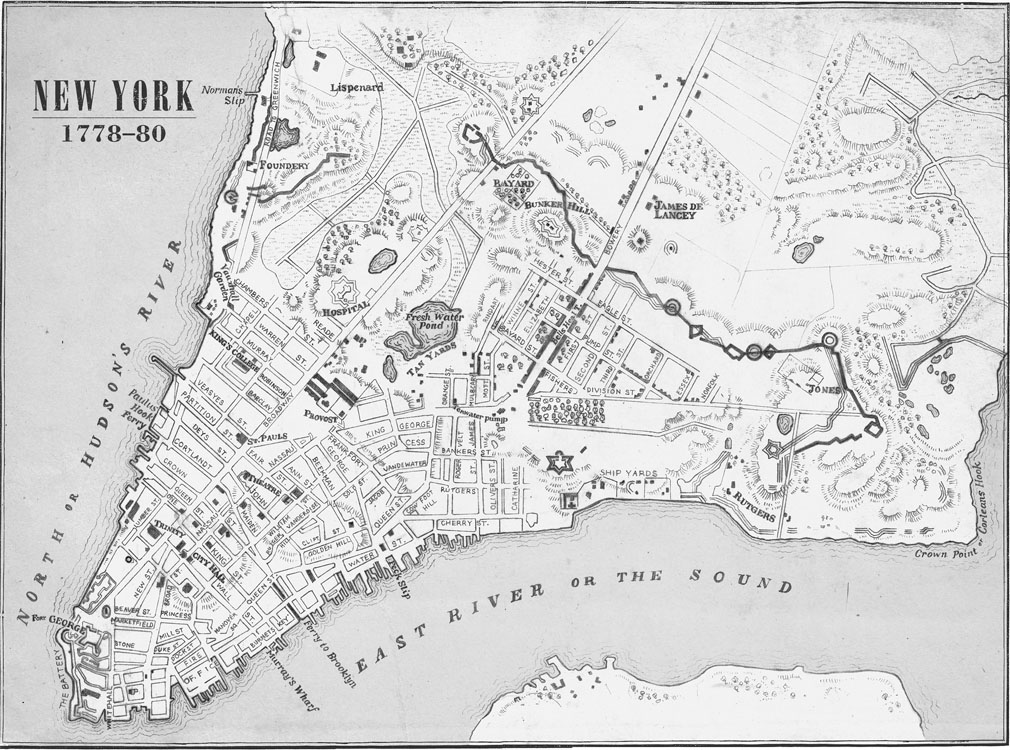
Chapter One
This is the story of a woman and a city. I saw the city first, glimpsing it from afar as it shimmered like the new Jerusalem in the light of the setting sun. I smelled the sweetness of the land and sensed the nearness of green, growing things after the weeks on the barren ocean. We had just passed through the narrows between Long and Staten islands and come into Upper New York Bay. It was Sunday, 2 August 1778.
The following morning, Mr Noak and I came up on deck an hour or two after dawn. The city was now close at hand. In the hard light of day it lost its celestial qualities and was revealed as a paltry, provincial sort of place.
We had heard that a conflagration had broken out during the night. Nevertheless, it came as something of a shock to see the broad pall of smoke hanging over the southern end of the island, which was where the city was. The stink of burning wafted across the water. Fires smouldered among the stumps of blackened buildings. Men scurried along the wharves that lined the docks. A file of soldiers moved to the beat of an invisible drum.
‘It’s as if the town has been sacked,’ I said.
Noak leaned on the rail. ‘The Captain says it must have been set deliberately, Mr Savill. This is the second fire, you know. The other was two years ago. They blamed the rebels then, just as they do now.’
‘Surely New York is loyal?’
‘For some people, sir, loyalty is a commodity,’ Noak said. ‘And, like any other commodity, I suppose it can be bought and sold.’
Above the smoke the sky was already a hard clear blue. I borrowed a glass from a young officer who was taking the air on deck. Most of the surviving houses of the city were of brick and tile, four or five storeys and crowned with shingles painted in a variety of faded colours. Some had balconies on their roofs, and already I could make out the tiny figures of people moving about above the streets. Many buildings nearer the southern tip had steeply gabled Dutch façades, relics of the days when the town had been called New Amsterdam.
‘I confess I had expected a finer prospect,’ I said. ‘Something more like a city.’
‘It looked well enough before the war, sir. But looks deceive at the best of times. Believe me, there is great wealth here. The possibility of profit. And the possibility of so much more.’
I looked down at the grey-green water running with the tide along the line of the hull. The oily surface was spotted with soot carried on the south-westerly breeze. The fire had broken out in the very early hours of the morning.
A large, pale rag billowed just below the surface of the water. Seagulls fluttered above it, crying like the souls of the damned. The rag snagged on a rope trailing from the ship to a dinghy alongside. The current made the cloth twitch as if alive. A few yards away from us, the young officer who had lent me his glass was standing by the rail. He swore under his breath.
The rag had a long tail, barely visible beneath it and entangled with the rope. It made me think of a merman or some other strange creature of the sea. The officer said a few sharp words to a sailor who, a moment later, leaned over the side with a long boathook.
‘Distressing,’ Mr Noak said, and clicked his tongue against the roof of his mouth.
I glanced at him. ‘What is?’
Noak nodded at the merman. The sailor had twisted the boathook into the rag. The water slapped and curled around it, growing cloudier and greyer.
Looks deceive at the best of times. Not a rag, I thought. A shirt.
The sailor heaved the boathook and its burden upwards. The shirt rose a few inches above the water. It twisted. The water around it was filthy now. There was a sucking sound as if the merman had smacked his lips. A waft of foul air rose up, forcing us to step back and cover our noses and mouths. Three seagulls swooped closer, sheering away at the last moment.
For an instant I saw the merman’s face – or, to be more exact, I saw where the face would have been, had it not been eaten almost entirely away by the creatures of the deep. Nor did the merman have a tail. Instead, two legs waved behind it. I glimpsed discoloured flesh flaking from swollen thighs and I smelled rotting meat.
The body fell back into the water. The current drew it swiftly away from the ship, and with it went the smell.
‘Can they not even bury the dead?’ I said.
The officer had heard me. ‘He was probably a prisoner from one of the hulks upstream, sir. Most of them are sailors from captured privateers. They tip them over the side.’
‘Do they not merit something better than this?’
His round, good-natured face split into a smile. ‘But there are so many of the knaves, sir, and he was only a rebel, after all.’
‘Cheaper, too,’ Noak pointed out. ‘Though as far as His Majesty’s Treasury is concerned it will come to the same thing. No doubt someone will claim the allowances due – for the shroud, the cost of committal and so on.’
I looked downstream. In the distance, the seagulls danced like blackened cinders against the blue sky. The body was no longer visible. The sea was greedy.
‘As I told you, sir,’ Noak went on, ‘there is the possibility of profit here, and that is true even in wartime. Indeed, perhaps more so than in peace.’
This was the first dead body that I saw in New York, and the first of the two dead men I saw that very day. As an individual, this one meant nothing to me, then or now. He and I had nothing in common apart from our shared humanity. I would never learn his name or how he died or who had thrown his corpse into the East River.
Chapter Two
I had met Samuel Noak on the voyage from England.
Mr Rampton, my patron, had arranged my passage on the Earl of Sandwich, a Post Office packet of which he was part-owner. The ship’s principal purpose was to carry the mails to and from North America and the West Indies. The owners supplemented the considerable income they derived from this by squeezing a handful of passengers into the cramped cabins. Most of them were, like myself, travelling on official business. But there were a few who made the voyage in a private capacity. Such a one was Mr Noak.
He and I were thrown into immediate intimacy for we were obliged to share a cabin little bigger than the commodious kennel that housed Mr Rampton’s mastiff at his house in the country. Noak was a small, spare man who wore his own sandy hair with only a modicum of powder for gentility’s sake and tied it with a brown ribbon. He scraped back the hair so tightly that the bones of his face seemed to poke through the skin. His figure was youthful but he might have been any age between twenty and forty. He spoke with a thin, nasal voice, and always with deliberation, in an accent that I later discovered was characteristic of his native Massachusetts. There was something of the puritan about him, a sourness of mien.
Even before we had weighed anchor, I resolved to keep a proper distance between Mr Noak and myself during the passage to New York. But I had not reckoned with the peculiar swaying motion of the ocean, let alone with the terrifying effects of rough weather.
Within a few hours of our leaving Falmouth, I descended into an abyss of spiritual and physical suffering. I was convinced that I was dying – that the ship was sinking; and my condition was so miserable that, for all I cared, the world might end in the next instant, which would at least put a period to my agonies.
It was then that I began to see Samuel Noak in a different light. For it was he who sponged my brow, who emptied my basin, who assisted me to the heads. It was he who forced me to undergo what he assured me was an old naval remedy for mal de mer: to wit, to swallow a lump of greasy pork again and again until the stomach no longer had strength to resist it.
Slowly, over the long days and longer nights, my symptoms subsided. Mr Noak brought me Souchong tea laced with rum and spooned it into my mouth, which eased my aching gut and at last encouraged me to fall into the first unbroken sleep I had enjoyed since leaving England.
Given Noak’s kindness, I could hardly hold the man at arm’s length, even if I had wished to do so. As I recovered, we slipped by degrees into a relationship that was something less than friendship but much more than mere acquaintance. It is difficult not to be civil to a man who has restored you to life.
‘Will you remain in New York, sir?’ I asked him one afternoon. The weather was calmer now, and we were strolling on deck after dinner. ‘Or do you travel on?’
‘No, sir – I have a position waiting for me in the city. A clerk’s desk in a contractor’s house. A friend of my uncle’s procured it for me.’
‘I’m surprised you should wish to leave London. The opportunities must be far greater there.’
‘True,’ he said. ‘But in New York I shall be a senior clerk, whereas in London I had no hope of advancement at all. Besides, I had a desire to see my native land again.’
‘Where were you employed?’
‘At Mr Yelland’s in the Middle Temple, sir. I had been there for three years.’
‘I believe I know the gentleman. That is to say, I have come across him once or twice.’
‘Indeed?’
‘I have a position at the American Department,’ I explained. ‘As you know, Mr Yelland acts as the British man of business for many Loyalists. He sometimes favours us with communications on their behalf.’
That was an understatement, as Noak must surely have known. Mr Yelland was one of several London attorneys who had reason to bless this unnecessary war, for it was proving very lucrative for them. He and his colleagues kept up a steady flow of letters to the Department. London was packed with displaced Loyalists who were convinced that the American Department owed them compensation for the losses they had sustained because of their attachment to the Crown.
‘Will you stay long in New York, sir?’ Mr Noak asked after a pause.
‘A month. Possibly two. Lord George has entrusted me with a commission and I do not know how long it will take.’
Mr Noak nodded, as if making a token obeisance to the august name of Lord George Germain, the Secretary of State for the American Department. The truth of my appointment was more prosaic: Mr Rampton, one of the two under secretaries, had decided that I should go to New York. Lord George had signed the necessary order, but I was not perfectly convinced that His Lordship knew who I was.
‘Perhaps we may encounter one another there,’ Noak said.
‘Perhaps, sir,’ I agreed, privately resolving that for my part I would not pursue the acquaintance once we reached America.
‘Where will you lodge?’
‘At Judge Wintour’s. He is an old friend of Mr Rampton, the under secretary.’
‘Ah yes,’ he said. ‘Of course.’
‘Are you acquainted with the Judge?’
‘Only by reputation, sir.’ Mr Noak paused. ‘They say his daughter-in-law is a great beauty.’
‘Indeed.’
‘And the heiress to Mount George, as well.’
‘I believe the air is growing chilly. I think I shall go below.’
‘Once seen,’ Mr Noak said quietly, ‘never forgotten. That’s what they say. Mrs Arabella Wintour, I mean.’
Chapter Three
At midday, a single cannon boomed from the battery commanding the entrance of the North and East rivers.
‘The noon gun, sir,’ the young officer told me with a knowing air as he took out his watch to adjust the time. ‘You’ll soon be ashore.’
Twenty minutes later, we were at last permitted to disembark. We were brought in at Beekman’s Slip upriver from the Brooklyn ferry to keep us at a distance from the still-smouldering fire.
The quayside was thronged with soldiers, seamen, officials and porters. It had grown even hotter, with a close, airless warmth. I threaded my way between boxes, barrels and ropes. Men barged into me. Once I tripped and nearly fell. After five weeks aboard a ship, dry land had become alien, even hostile.
Despite my official standing, I was obliged to wait my turn to show my papers and explain my business to three separate individuals. Meanwhile the baggage was brought ashore. A line of glistening negros carried it to the customs shed. The few passengers from the Earl of Sandwich joined the queue outside where new arrivals sweltered in the sun.
The south-westerly breeze had dispersed most of the smoke. Beyond the shed the buildings of the shabby little city stretched away to the west, sloping gently up towards the soot-stained tower of a ruined church. Mr Noak had told me that this was Trinity Church, damaged in the first fire two years earlier just after the rebels had evacuated New York, when so many houses and public buildings had been destroyed. He wondered why no one had troubled to repair it.
There was a stir at the guard-post by the entrance to the slip. A moment later a portly gentleman strode towards the customs house with the sergeant of the guard on one side and a harbour official on the other. The latter indicated me with a wave of his hand, and the gentleman surged forward, sweeping off his hat. He was a tall, finely dressed man with an upright carriage and florid face.
‘Mr Savill?’ he said, waving a crisp lawn handkerchief like a signal flag. ‘Your servant, sir. I’m Charles Townley, and so very much at your service. A thousand pardons – you should not have to stand about in this heat. I should have been here to greet you two hours ago but my clerk is ill and, to make matters ten times worse, this damned fire has thrown everything awry.’
Mr Townley’s arrival had an instant effect on my fortunes. A customs official hurried over with two negros carrying my boxes and valises. There was no need, the official said, for the formality of searching them and, at Mr Townley’s suggestion, he would have them instantly conveyed to Judge Wintour’s house. My pass was countersigned and I was free to go.
As I left, I bowed to Mr Noak, waiting silently in the queue, and said something civilly non-committal about our no doubt meeting again.
‘Who was that?’ Townley asked as we passed the barrier manned by two sweating sentries.
‘A shipboard acquaintance,’ I said. ‘No one in particular.’
‘You will not mind if we walk, I hope? We have not far to go and it will be quicker on a day like this.’
For the first few hundred yards, the solid ground felt unyielding and inhospitable beneath my feet. Nor was the city itself more welcoming – it was a veritable anthill, packed with hurrying, wild-eyed people, many of them carrying their belongings on their backs, and with wagons and carriages rumbling over the stones. The streets were paved and tree-lined but narrow. I felt the buildings were closing in on me and yet, after the confined ship, there was also an unsettling sense of limitless space. The air smelled strongly of burning.
‘It’s busy enough on any other day,’ Townley observed. ‘But the fire has made everything ten times worse. The world and his wife are abroad. If they haven’t lost their homes then they wish to gawp at those who have.’
‘Is the damage considerable, sir?’
‘Bad enough. Fifty or sixty houses are gone – perhaps more. It began in the middle of the night over there to your left, near Cruger’s Wharf and Dock Street. We have fire engines, of course, but our men were overwhelmed by the speed of it, and there were difficulties with the pumps.’
‘Has there been loss of life?’
‘No, we have been spared that, I believe. Through the mercy of God.’





